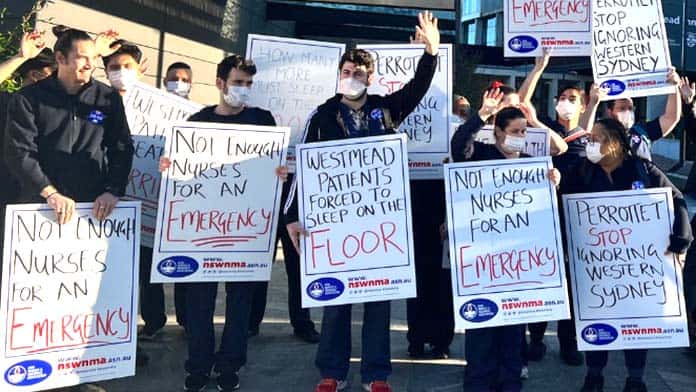A new surge in COVID cases over the last month has shown that the pandemic is far from over. Hospitalisations were approaching an all-time high nationwide of almost 5500 as we went to print, leading to a worrying shortage in hospital beds.
The president of the Australian Medical Association, Dr Omar Khorshid, said the state of hospitals is, “The worst it has ever been … because we will have flu and COVID in every state and territory.
“And we haven’t actually fixed any of the problems, so there’s no extra capacity, there’s no extra staff. Nothing had been done to help the system to cope with this foreseeable increase in demand.”
Governments have failed to act even into the third year of the pandemic.
Yet instead of an outcry about increasing hospital staff or other measures, the media focus is on whether to re-introduce mask mandates.
Almost 8000 of the just over 10,000 deaths from COVID have come this year. The deaths are overwhelmingly among older people, with over 60 per cent of those who have died over 80 and 85 per cent over 70.
Yet governments have still failed to properly staff aged care centres to cope. One third of centres are already battling an outbreak, with cases expected to increase further in coming weeks.
The Committee for Economic Development of Australia released a report detailing the continued deterioration of aged care staffing since the royal commission. It found that the shortfall of workers in aged care is now 30,000 to 35,000, double that of a year ago. And 38 per cent of the total workforce plan to leave the sector in the next five years.
Improving pay and conditions in aged care is the only way to attract more workers to the sector, particularly given the high levels of inflation.
But instead of learning from the devastation caused by the pandemic and preparing the healthcare system, the government is instead massively funding major military projects, such as the AUKUS nuclear submarine deal at a cost of $170 billion.
Vaccination
A third or fourth vaccine booster is one of the most effective ways to reduce deaths and serious illness. Figures from early July showed that three-quarters of the Victorians who have died this year had not had a third shot.
Far more needs to be done to encourage and promote vaccination. Only 71 per cent of the eligible population have received their third dose.
The booster rollout in aged care has also been far too slow. At the start of July only 65 per cent of aged care residents had been given their fourth shot, despite the fact they have been available for over-65s from the start of April. This has undoubtedly cost lives.
Greater access to antiviral medication also needs to be provided. Studies have shown that antiviral medication reduces hospitalisations by 30 per cent.
Anyone aged 70 or over, or those with at least two risk factors for severe disease and aged over 50, are now eligible. But many still don’t know the medication is available.
This is a major problem as antivirals need to be taken within five days of the onset of symptoms to be effective. The requirement of a prescription from a GP and the reluctance of pharmacies to stock them mean many people pass the five-day mark before they can get access, especially in regional areas where their GP may not be readily available.
A text message to positive cases and easier access to the medicine would be easy to implement and would prevent hospitalisations.
It is widely known that COVID is transmitted through the air over short and long distances primarily indoors, and that the most effective prevention is to create cross ventilation with open windows. But in the coldest and hottest months of the year, opening windows can be impractical. Better ventilation systems can play an important role in reducing COVID transmission.
Yet the government has done little to fund and install heating, ventilation and air conditioning systems in schools and offices. This would prevent the spread of COVID in indoor spaces and improve air quality, which has many other health benefits. Good quality N95 masks can also help slow transmission and should be free and widely available.
COVID is not going away any time soon. We need to demand governments act to provide the funding needed to allow hospitals and aged care to cope, and proactive measures to improve the take-up of vaccine boosters and antivirals. Our health is more important than their plans for budget austerity and cuts.
By Daniel Bickle-Lazarow






